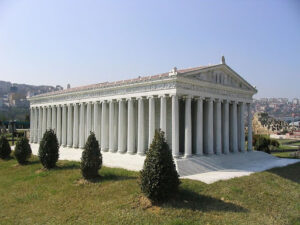
To the Church in Ephesus
“To the angel of the church in Ephesus write:
These are the words of him who holds the seven stars in his right hand and walks among the seven golden lampstands. I know your deeds, your hard work and your perseverance. I know that you cannot tolerate wicked people, that you have tested those who claim to be apostles but are not, and have found them false. You have persevered and have endured hardships for my name, and have not grown weary.
Yet I hold this against you: You have forsaken the love you had at first. Consider how far you have fallen! Repent and do the things you did at first. If you do not repent, I will come to you and remove your lampstand from its place. But you have this in your favor: You hate the practices of the Nicolaitans, which I also hate.” Revelation 2:1-6
Way way back in the day, when I was just out of high school, I fancied myself a history buff. Those were the days when all of the world’s knowledge lived in encyclopedias. And going to my family’s World Book Volume E, I would have not found what I can today.
If New York is the Big Apple, in Turkey, Ephesus was the Big Fig. For those days, its population was outlandish. 250,000 plus. It was situated to be the trade hub for the area. As a result, people from all over the world went in and out of the city. Bringing with them a myriad of different ways of believing. Christianity was just one of many.
The Temple of Artemis ruled the roost and with it came ritual prostitution, and many other practices that were antithetical to the teachings of Jesus. When Paul wrote the following to Timothy, the leader of the church in Ephesus, he had this very thing in mind.
“For the time will come when people will not put up with sound doctrine. Instead, to suit their own desires, they will gather around them a great number of teachers to say what their itching ears want to hear. They will turn their ears away from the truth and turn aside to myths. But you, keep your head in all situations, endure hardship, do the work of an evangelist, discharge all the duties of your ministry.” 2 Timothy 4:3-5
Sounds a whole lot like what we are seeing today, right here at home. It is why we must always follow the lead of the saints in Berea.
Now the Berean Jews were of more noble character than those in Thessalonica, for they received the message with great eagerness and examined the Scriptures every day to see if what Paul said was true. Acts 17:11
What does God’s Word say?
I want to address something I didn’t know until yesterday. Just who were those Nicolaitans, and why did John and the Ephesians hate what they were doing? The Nicolaitans were an outgrowth of the teachings of Nicolas. So, who was he? And that’s where this gets spicy.
“Brothers and sisters, choose seven men from among you who are known to be full of the Spirit and wisdom. We will turn this responsibility over to them [care of the widows in the church] and will give our attention to prayer and the ministry of the word.”
This proposal pleased the whole group. They chose Stephen, a man full of faith and of the Holy Spirit; also Philip, Procorus, Nicanor, Timon, Parmenas, and Nicolas from Antioch, a convert to Judaism. Acts 6:3-5
That is Nicolas, listed last: someone who had become an insider in the early Christian church. He came from paganism and had deep pagan roots, very much unlike the other six deacons who came from a pure Hebrew line. Nicolas’ pagan background meant that he had previously been immersed in the activities of the occult. He started his sojourn with the teachings of Jesus, but he was influenced by his pagan background, and his teachings ultimately were seriously opposed to those of Jesus.
According to the writings of the Early Church leaders, Nicolas taught a doctrine of compromise, implying that total separation between Christianity and the practice of occult paganism was not essential. From Early Church records, it seems apparent that this Nicolas of Antioch was so immersed in occultism, Judaism, and Christianity that he had a stomach for all of it. He had no problem intermingling these belief systems in various concoctions and saw no reason why believers couldn’t continue to fellowship with those still immersed in the black magic of the Roman empire and its countless mystery cults. Because of his previous position in the early church, Nicolas potentially had the ears of many. That is why John starts there, and not with Artemis. Nicolas was an internal threat.
Eyes and Ears Open!!
by Bruce Hanson
Note. To access scripture links that don’t appear in the email version, read the differently formatted web version in your browser.

